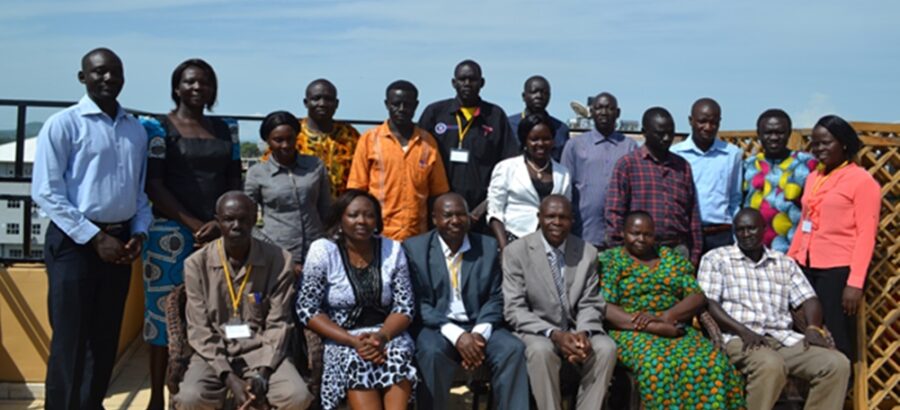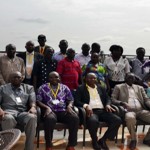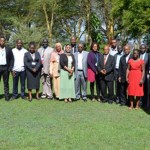Introduction
In line with the Activity plans for 2015 for South Sudan under the Standard Methods and Procedures in Animal Health Project, a national workshop for creating a community-based grassroot disease reporting system for South Sudan was held at James Hotel in Juba from 4th to 5th June 2015. Its main aim was to enhance passive surveillance of transboundary animal diseases through improving disease recognition coupled with strengthening disease reporting by grassroot livestock stakeholders. The workshop brought together key players from the public and private sector engaged in the delivery of animal health service. Past Community-based Animal Health Programmes successfully implemented in South Sudan were reviewed in light of the existing Government structure for delivery of veterinary services. A model community-based grassroot disease reporting system was then proposed. A total of 23 participants drawn from Ministry of Livestock and Fisheries, State Ministry of Animal Resources and Fisheries, wildlife Services, pharmaceutical companies, ICRC, VSF – SUISSE, AU-IBAR and IGAD attended the workshop.
In his remarks, Dr Joseph Magona, on behalf of the Director, AU-IBAR, Prof. Ahmed Elsawalhy, thanked the Government of South Sudan in general and Ministry of Livestock and Fisheries in particular in organizing the workshop for creating a Community-based grassroot disease reporting system. He noted that transboundary animal diseases (TADs) continue to affect livestock production and trade in the region. There was need therefore to enhance passive surveillance a means of tackling TADs. He highlighted the fact that the workshop for creating a community-based grassroot disease reporting system in South Sudan was intended to establish a system for improving grassroot disease recognition and strengthening disease reporting grassroot livestock stakeholders. He encouraged all livestock stakeholders in South Sudan to participate in disseminating and using the syndromic manual in order to improve disease recognition at the grassroot. It was anticipated that through such a system grassroot stakeholders such as livestock keepers could transmit disease reports to Community Animal Health Workers, Field veterinarians, Private Vets Operating Drug shop, and in general the entire disease control system to allow prompt disease response.
In his opening remarks, Dr Aluma Araba, on behalf of the Director General of Veterinary Services for South Sudan, pointed out the importance of SMP-AH project in supporting the people and the government of South Sudan in livestock activities. SMP-AH has supported South Sudanese citizen in training on management skills, laboratory diagnostic techniques, disease surveillance and quarantine management. He also pointed out the importance of embracing a community-based animal health programme, given past success in South Sudan especially during the eradication of Rinderpest. Ultimately he welcomed all participants to the workshop and declared the workshop officially open.
The workshop achieved the following:
- An operational disease reporting mechanism discussed
- Community involvement in disease surveillance at grass root discussed
- A network for disease surveillance and reporting linking the field to national players was initiated
Proceedings
The workshop was conducted through presentations, plenary discussions and group work.
Key topics discussed
Key topics discussed included the following:
- Overview of the SMP-AH Project and support of active and passive surveillance of transboundary animal diseases in Member States
- CBAHP experience sharing of OLS in South Sudan and the success story of Rinderpest eradication
- Awareness package on community-based disease reporting system
- NGOs supporting CBAHP success and challenges facing them in controlling trade sensitive TADs
- Development of a model Community-based grass root disease reporting system
Developments of action plans
Group work on the development of follow-up on activity implementation identified the following areas for immediate action:
- Conducting awareness creation workshops in all the States and the two Administrative Areas for stake holders including the cattle owners representatives on the importance and means of community based disease reporting system
- Assigning focal points/coordinators in all the channel structure in the disease reporting system in all the States, the two AAs and the national ministry.
- Establishment of user-friendly formats for disease reporting to be used at all levels of the disease reporting system.
- Conduct training workshops for the disease reporting focal points/coordinators on the use of the disease reporting formats established.
- Conduct bi-annual national coordination meetings to share information and validate using modern technology.
Recommendations
Upon discussion on the afore-mentioned topics and pertinent concerns arising therein, the participants recommended the following:
To Government of Republic South Sudan (GRSS) and AU-IBAR
- To support community based disease reporting system establishment in South Sudan through capacity building, awareness packages and implementation.
- To supply more copies of field manual of animal diseases by syndrome to stakeholders for easy disease reporting system.
- To provide computer for the ARIS program and training of staff in ARIS II software to enhance capacity for database management
- To provide smart phones and training of users to strengthen community based disease reporting system
To GRSS
- To hold annual coordination meeting for the disease reporting focal points, NGOs, Agencies and AU IBAR to discuss and address issues pertaining to the community-based disease reporting system.
- To establish user friendly formats for disease reporting to be used at all levels/channels, and should include the frequencies for the reports as well as emergency response disease reports.
To GRSS, SMARF, AAs
- To implement the SMP and Syndromic manuals and provide feedbacks on the success and challenges thereafter.
Way forward
- Organize an annual national workshop and involve development partners and AU-IBAR to share experiences and challenges in implementing community-based disease reporting system at grass root level in South Sudan.
- SMP AH team to work with the State Ministries of Animal Resources and Fisheries, private sectors, NGOs, and Agencies to ensure the implementation of community based disease reporting system.
- Provide SMP-AH Syndromic field manuals to stakeholders (CAHWs and Veterinary Officer) to enhance community based disease reporting system.
- SMPAH team should monitor the follow-up on the recommendation.
- SMP-AH focal person and the Director-General of Veterinary Services to ensure institutionalization of the implementation of community based disease reporting system.






